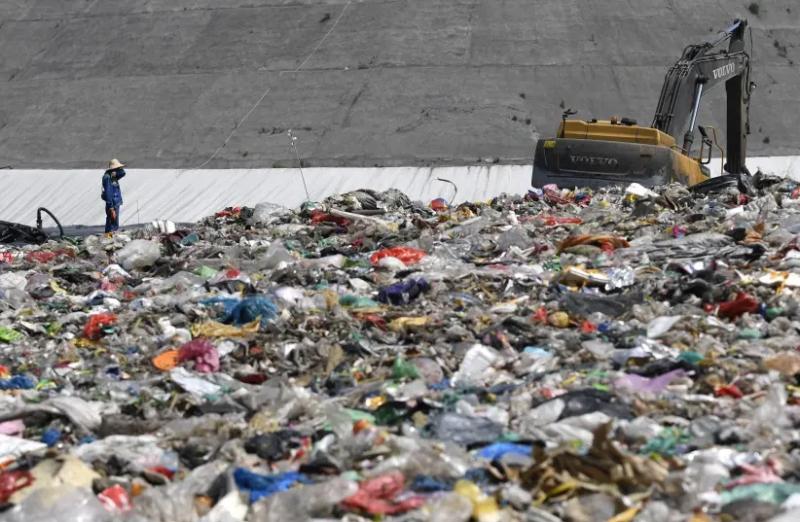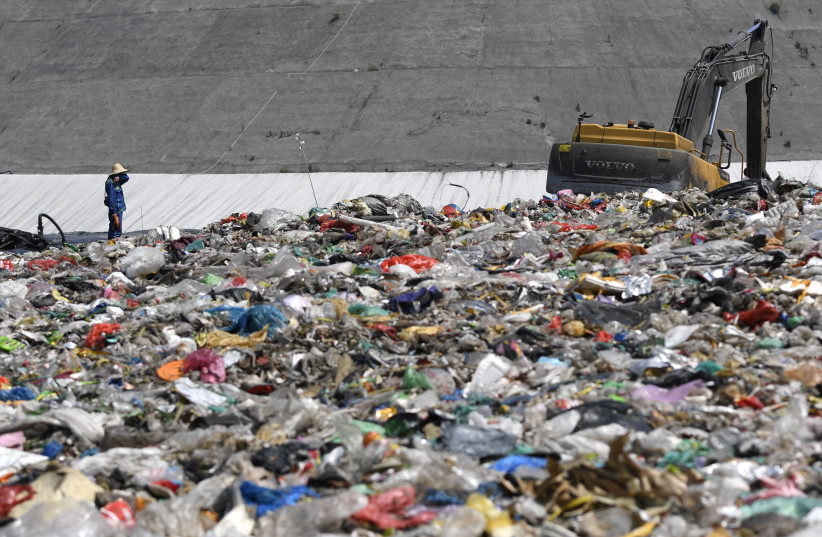Israeli researchers find method to convert carbon-containing waste to gas
Category: Health, Science & Technology
Via: buzz-of-the-orient • 5 years ago • 13 commentsBy: EYTAN HALON


Israeli researchers find method to convert carbon-containing waste to gas
Carbon-containing waste has presented an increasingly problematic challenge for industrialized societies

An environmental worker stands near an excavator amid waste at Tianziling landfill in Hangzhou, Zhejiang province, China August 7, 2019. (photo credit: REUTERS/STRINGER)
Researchers at Ben-Gurion University of the Negev ( BGU ) unveiled a new technology on Sunday to turn carbon-containing waste into gas for energy production, offering a promising alternative to sending waste to landfills.
The innovative gasification method, developed by researchers at BGU’s Laboratory for Clean Combustion, uses the “unique chemical properties” of supercritical water to actively decompose organic material into gases with a range of potential uses and lightly dissolve inorganic material. Water is heated to over 374 degrees Celsius and pressurized to more than 219 atmospheres, reaching a state where distinct liquid and gas phases can no longer be identified.
Carbon-containing waste, including mixed plastics and used tires, has presented an increasingly problematic challenge for industrialized societies. Methods to turn waste into energy serve a dual purpose, researchers said, by both reducing landfills and producing energy from nonfossil fuels.
Organic components are dissolved by supercritical water into hydrogen, methane and carbon dioxide. Hydrogen and methane produced by dissolving organic materials can serve as fuel sources and feedstocks for the chemical industry. Hydrogen is particularly relevant to the automotive industry’s efforts to replace gasoline. Methods of gasification can also provide a potential solution to safely treat hazardous waste, researchers say.
While supercritical gasification methods have been studied for decades, the novel approach developed by researchers at BGU uses heat-transfer methods to return energy used for warming supercritical water and materials back into the process.
“It is necessary to find a method that can separate the useful component of waste from useless or dangerous components; supercritical water gasification is such a method, since water in a supercritical state has a unique property,” Dr. Efim Korytnyi, who led the six-year research project, told The Jerusalem Post.
“It dissolves the organic part of the waste without affecting the inorganic one,” he said. “As a result, the organic part of the waste is almost completely processed into a gas, while the inorganic part remains in the ash and is subsequently removed. Since oxygen is not used in the process and the temperature is relatively low, no harmful gas components are formed. These features make supercritical gasification extremely attractive.”
As most communal and industrial waste contains both organic and inorganic substances, organic matter is converted into gas, and solid inorganic elements can either be used for additional purposes or interred in landfills. The researchers emphasized that the combination of unique properties of supercritical water and continued technological innovation will ultimately outperform existing waste-to-gas solutions.
The latest research was supported by the Energy, Environment and Economy ministries. The BGU researchers are currently in discussions with two companies to develop a pilot facility and commercialize their technology.
“The process has been intensively studied for the past 10 to 15 years with a view to implementation, yet the task is not to recycle the waste but to do it efficiently,” Korytnyi said. “We discovered the features of heat transfer in supercritical gasification, which limit the return of heat to the process by standard methods and offer new technological schemes, which, in our opinion, should demonstrate more efficiency than conventional technologies.”



The science of this is beyond me, but the benefit to the environment isn't.
Just think of it as high temp and high pressure rendering. To keep the water that hot, 705 F, to me would seem to take quite a bit of energy and with every batch the heat has to be recovered to reheat the batch. With the gas recovered is it enough to keep such a system going without further input?
Israel seems to be very adept at utilizing resources and working with the environment efficiently. I suppose that's mainly because they have had to. America could draw inspiration from their practices, but it doesn't seem like most of us are paying attention.
Yet there are many Americans, including some Democrats in Congress, who support the Palestinian cause even though they have produced NOTHING to benefit mankind, and focus their attention only on making life difficult for Israel and Israelis.
I think it's just another manifestation of political tribalism. Conservatives support Israel, therefore the Left thinks Israel is some kind of global plague. I mean it's fine to want to help Palestinians - noble even - but some people act like the Israelis are the ones blowing up buses and cafes or hiding missile launchers in schools and hospitals.
This is great news. It will take time to implement this I'm sure.
Especially with the scale it will have to be done on. I am sure they are only handling very limited amounts of material right now.
It takes time for that kind of change. We still await the electric car to dominate the car market.
That's nothin! I been converting carbs to gas for years!
LOL. As have we all - maybe that's why the glaciers are melting.
I do feel somewhat responsible.